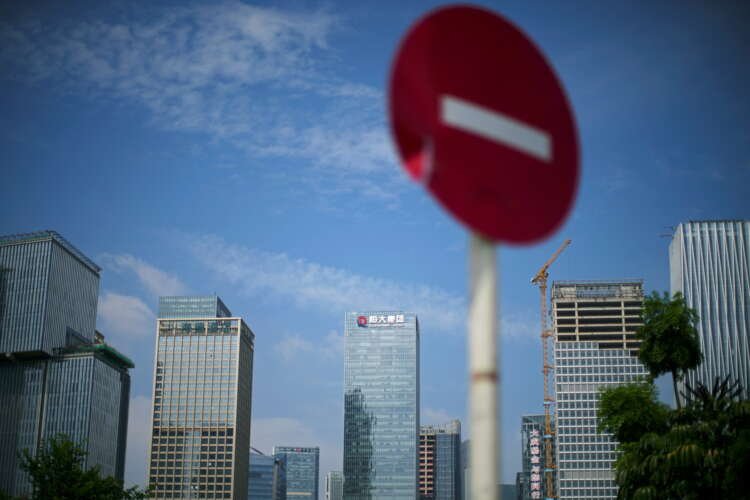Evergrande set to miss second offshore bond coupon payment this month, sources say
Published by maria gbaf
Posted on September 30, 2021
5 min readLast updated: February 1, 2026

Published by maria gbaf
Posted on September 30, 2021
5 min readLast updated: February 1, 2026

Evergrande missed another offshore bond payment, raising global financial concerns. The company prioritizes domestic creditors, with restructuring likely.
By Andrew Galbraith, Anshuman Daga and Karin Strohecker
HONG KONG (Reuters) – At least some of China Evergrande’s offshore bondholders had not received a due coupon payment by the close of Asia business on Wednesday, sources said, although the cash-strapped developer reached a $1.5 billion deal to settle debt with a Chinese bank.
With liabilities of $305 billion, Evergrande has sparked concerns its woes could spread through China’s financial system and reverberate around the world – a worry that has eased with the Chinese central bank vowing to protect homebuyer interest.
The company, which has nearly $20 billion in offshore debt, was due on Wednesday to make a $47.5 million bond interest payment on its 9.5% March 2024 dollar bond. It also missed paying a $83.5 million in coupon on another bond last Thursday.
Two people familiar with the matter, who declined to be named due to the sensitivity of the matter, said at least some of the holders of the 2024 bonds had received no information from Evergrande about the payment on Wednesday.
It was not immediately clear if the payment could still be made during U.S. business hours.
A spokesperson for Evergrande did not have any immediate comment. Reuters was unable to determine whether Evergrande had told any of the bondholders what it plans to do about Wednesday’s coupon payment.
Evergrande’s silence on its offshore payment obligations since the missed payment last week has left global investors wondering if they will have to swallow large losses when 30-day grace periods end for coupons due on Sept. 23 and Sept. 29.
The company, once China’s top-selling developer and now expected to be one of the largest-ever restructurings in the country, has been prioritising domestic creditors over offshore bondholders.
For Evergrande, “the most likely outcome is debt restructuring with some help from the government,” said Wai Hoong Leong, portfolio manager for the KraneShares Asia Pacific High Yield Bond ETF, in a presentation to investors on Wednesday. “We expect the government and Evergrande to focus on protecting the customers and suppliers, while ensuring an orderly restructuring for creditors who are likely to take a larger impact.”
It missed the payment deadline on a dollar bond last Thursday, a day after its main property business in China said it had privately negotiated with onshore bondholders to settle a separate coupon payment on a yuan-denominated bond.
In the latest such move, Evergrande said in an exchange filing earlier on Wednesday that it would sell a 9.99 billion yuan ($1.5 billion) stake it owns in Shengjing Bank Co Ltd to a state-owned asset management company.
The bank, one of Evergrande’s main lenders, demanded all net proceeds from the sale go towards settling the developer’s debts with Shengjing. As of the first half last year, the bank had 7 billion yuan in loans to Evergrande, according to a report by brokerage CCB International, citing news reports.
The move highlights the role state-owned enterprises may play in Evergrande’s denouement.
“We are in the wait-and-see phase at the moment. The creditors are organising themselves and people are trying to figure out how this falling knife might be caught,” said an adviser hired by one of the offshore Evergrande bondholders.
“The clock has started to tick on a restructuring process. The company is going to need to do something, it’s obviously struggling with liquidity … the liquidity issue is what brings the house of cards down.”
GOVERNMENT PRODDING
Once the face of China’s frenzied building boom, Evergrande has now become the poster child for a crackdown on developers’ debts that has spurred volatility in global markets and left large and small investors sweating their exposure.
Evergrande’s troubles slammed global stock markets earlier this month, although some global investors have since shifted their focus to political wrangling in Washington over the U.S. debt ceiling and a rise in Treasury yields that has pressured stocks. [.N]
Nonetheless, any negative surprise from Evergrande could give stock market bears more ammunition.
Rating agency Fitch on Wednesday downgraded the long-term foreign-currency issuer default ratings (IDRs) of Evergrande and its subsidiaries, Hengda and Tianji, citing likely nonpayment of offshore bond interest last week.
Bloomberg reported on Wednesday that Marathon Asset Management is buying debt issued by Evergrande Group, citing the investment firm’s co-founder and chief executive officer, Bruce Richards.
Beijing is prodding government-owned firms and state-backed property developers such as China Vanke Co Ltd to purchase some of Evergrande’s assets, people with knowledge of the matter told Reuters.
Authorities are hoping that asset purchases will ward off or at least mitigate any social unrest that could occur if Evergrande were to suffer a messy collapse, they said, declining to be identified due to the sensitivity of the matter.
On Monday, China’s central bank vowed to protect consumers exposed to the housing market, without mentioning Evergrande in a statement posted to its website, and injected more cash into the banking system.
Those moves have boosted investor sentiment towards Chinese property stocks in the last couple of days, with Evergrande stock rising as much as 17% on Wednesday before closing 15% higher.
(Reporting by Anshuman Daga, Andrew Galbraith, Tom Arnold, Clare Jim, Karin Strohecker, Donny Kwok and Ira Iosebashvili; Writing by Sumeet Chatterjee; Editing by Kirsten Donovan and Matthew Lewis)
Evergrande's missed offshore bond payments and its financial implications.
Evergrande's financial troubles could impact global markets and the Chinese economy.
Evergrande is negotiating debt settlements and may undergo restructuring with government assistance.
Explore more articles in the Top Stories category











